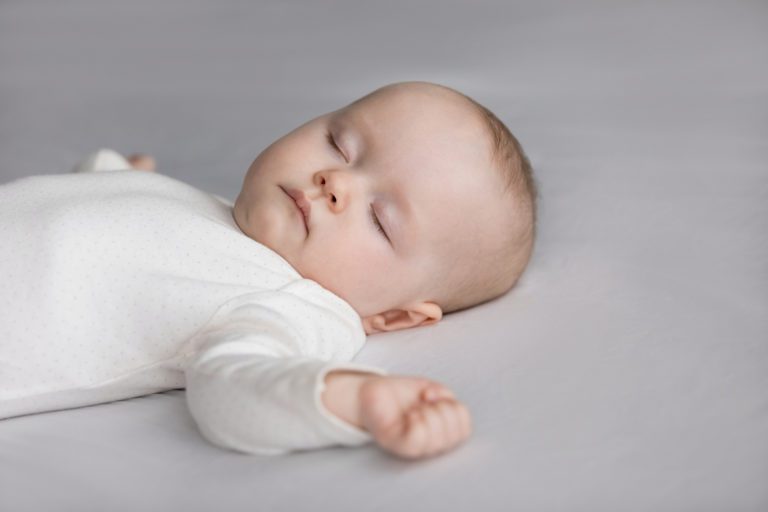Setting good sleep habits with baby from birth is critical for both baby’s safety and your sanity. It may be months before your baby sleeps through the night so use this time to set good sleep habits because bad habits are hard to quit! The first few weeks with your newborn may be the most challenging as babies need to feed and be changed every 2-4 hours—this is normal. Know it’s OK to be tired and feel exhausted; still, you can do this! This time will seem long, but it will pass quickly as most babies begin to sleep “through the night” around 9-12 months.
Until that happens, remember to:
- Nap when baby naps
- Go to bed when baby goes to bed
- Know your sleep will be interrupted—but not forever
Avoid these Infant Sleep Mistakes
We get it, you’re exhausted—and this can lead to accidents that could be harmful for baby. To avoid these risks
- Let baby sleep with you in your room, but never in your bed
- Always put baby to sleep on a safe infant sleep surface like a crib or bassinet that you can put close by in your room
- Always place baby on their back—never their stomach or sides—for sleep
- Avoid making a “cozy nest” with pillows or other soft items in baby’s sleep space—those pictures are cute but dangerous for baby by increasing their risk of Sudden Infant Death Syndrome (SIDS)
Safe Sleep Recommendations
- Do not sleep with your baby (called bedsharing). Room-share is best
- Position baby on their back for all sleep. Side positions are not safe
- Use a safety-approved crib or bassinet with a fi rm mattress and tight sheet
- Keep all soft items out of the bed, including blankets, pillows, bumper pads, and stuffed toys
- Breastfeed! It’s protective and the more the breastmilk your baby gets the better
- Offer your baby a pacifier – it’s protective
- Avoid tobacco smoke exposure during pregnancy and after the baby is born
- Avoid alcohol, marijuana, or illicit drugs during pregnancy and after the infant is born
- Keep the baby from overheating with either clothing or high room temperatures
- Go to all prenatal visits when you are pregnant
- Provide all recommended immunizations – this is protective
- Avoid monitors or devices marketed to reduce the risk of SIDS
- Do not use sitting and carrying devices for routine infant sleep
- Provide “tummy time” when the baby is awake and supervised
- Educate everyone who cares for your baby about these safe sleep rules
Good Sleep Habits
Good sleep habits are safe sleep habits. In terms of safety, the American Academy of Pediatrics (AAP) has published a list of safe sleep recommendations to help prevent sleep related deaths, including SIDS (see Safe Sleep Recommendations). Following this advice from the AAP is a critical first step.
Next, think about developing a healthy (and consistent) bedtime routine. An important goal is for the baby to be able to go to sleep on their own, and eventually to be able to go back to sleep on their own when they are lightly awaken, this is called “selfsoothing.”
Healthy Bedtime Routines
Here are some ideas to help you form an enjoyable bedtime routine now and as your baby grows. Make your routine enjoyable so that baby will enjoy and look forward to this transition that signals that bedtime is coming soon.
Learn your baby’s sleepy cues, such as them rubbing their eyes, yawning, or getting fussy. Begin your bedtime routine 30-60 minutes before you want baby to drift off to sleep. Set the stage for successful sleep with the following routines:
- Start your routine before baby is overly tired
- Decrease the lights, activities, and noise
- Sing softly, quietly talk, or read a book
- Give baby a bath or wash their face with calming warm water and a soft cloth
- Put on their cozy pyjamas or swaddle blanket
- Nurse or feed baby; try not to let them fall asleep in your arms as this becomes a hard habit to break
- Offer a pacifier to reduce SIDS risk, as per the AAP
Finally, lay baby down in their crib as they become drowsy but before they fall sleep. This helps them learn to go to sleep without needing to be held, fed, or rocked.
YOUMAY ALSO LIKE: Pediatricians Update Safe Infant Sleep Guidelines






Comments are closed.